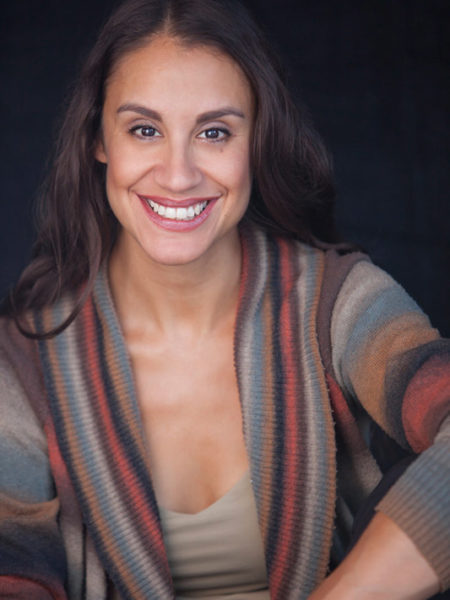
Sabina Zuniga Varela
Sabina Zúñiga Varela MFA ’11 made her off-Broadway debut in July, reprising her role as Medea in the Public Theater production of Luis Alfaro’s new adaptation of his play, Mojada, inspired by ancient Greek mythology. This version, directed by Chay Yew, is the story of a Mexican immigrant in Queens, New York.
Zúñiga Varela’s history with the play began in 2012 with her casting in Alfaro’s first iteration of the work, Bruja, at the Magic Theatre in San Francisco. She returned to the role in Alfaro’s 2015 adaptation, Mojada: A Medea in Los Angeles, at the Getty Theatre, a collaboration with the Theatre@Boston Court. She repeated the role in 2017 at the Oregon Shakespeare Festival.
“It’s been quite a journey,” Zúñiga Varela says. “It’s an interesting exercise as an artist to have to clean out the ghosts of past scripts and come to this one with new eyes. Luis is such a collaborator and communicator, and he’s constantly shifting his pieces to reflect what’s going on in the community, in the world. It’s a new play every time, and I approach it that way.”
Her experience with Alfaro’s Greek-inspired plays also includes Electricidad in 2008, with her former theatre company in New Mexico; and Oedipus el Rey at the Dallas Theater Center in 2014.
“And now I [made] my off-Broadway debut in this beautiful piece,” she says.
Zúñiga Varela came to Los Angeles in 2008 from Albuquerque with an MA in Education, a certification as a special education teacher, and with experience as an actor-director in Latina theatre troupe Las Meganenas and as a founding member of Teatro Nuevo Mexico, a Latino theatre company.
“In 2003,” Zúñiga Varela says, “I got together with some fellow theatre makers, community organizers and leaders with the mission of reviving what used to be a strong Latino theatre presence in Albuquerque. I realized there wasn’t a lot of material reflecting someone that looked like me, a darker-skinned Latina. And I had a lot of friends around me, Native Americans and Latinas that just didn’t feel like [we fit].” With Teatro Nuevo Mexico, “we produced all-Latino programming at the National Hispanic Cultural Center and other locations well into 2008. “It’s kind of what pushed me into acting, got me into realizing that part of my artistry.”
“So there was a point when I was helping run the two theatre companies, bartending, going to grad school, and teaching middle school,” she says. “I actually did my USC audition pieces for my students and they gave me notes.” Saying goodbye to her students, she adds, “was heart-breaking.”
Zúñiga Varela’s decision to apply to USC’s MFA in Acting program was sparked by reading the program’s then-director Andy Robinson’s thoughts “about what it means to be an actor, the commitment and responsibility of putting into it your whole self and understanding, your genetic history…this amazing rainbow of possibilities. It felt very holistic and seemed to be the way I approached my work already. It was the only MFA that I auditioned for,” she notes. “I went into it thinking I’d been doing theatre for 10 years, I know what I’m doing, [but the program] “made me understand the depth and strength needed to be alive moment to moment when it comes to theatrical work. And I used everything that I learned in that program in my everyday life.
“More than a MFA in acting, I think I got a Masters of Fine Arts in how to live as an artist and be a creative person sustainably, how to take care of myself emotionally, spiritually and physically. It was a phenomenal three years. I almost quit the first year because there was some family stuff going on, but what I realize now is that I was getting to the threshold of who I was as a creator. It nearly broke me and then it built me back up…and all of a sudden I’m seven years into a professional acting career.”
An active USC alum, Zúñiga Varela is a mentor and consultant for MFA acting graduates “getting ready to leave the nest. I talk to them about everything — taxes, unemployment, insurance, health care — because I really believe in the program.”
This story appeared in the 2019-20 Callboard magazine.